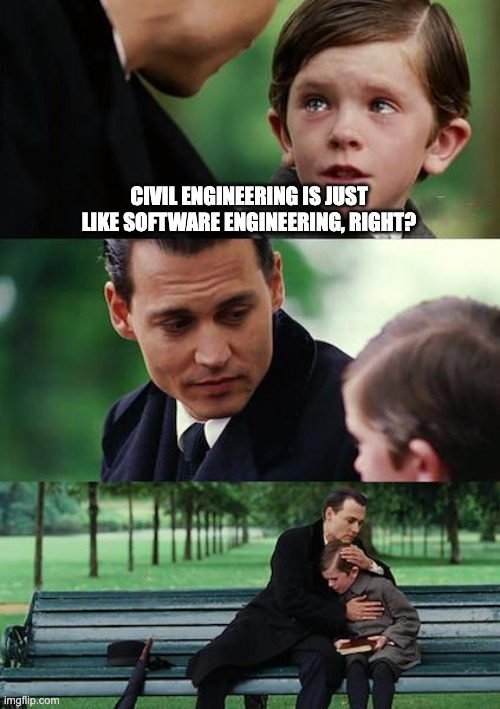Hope is not a strategy
"The cow gets fat from the eyes of the owner."
— Maasai Proverb
During COVID I decided to take a break from building tech and joined my brothers to help them with their construction business. Neither event was connected, but t'was the season and I dove in.
While software development is a young people's game, civil engineering is as old as the earliest civilizations. When they say "Rome wasn't built in a day", they mean it. The amount of planning, coordination, and supervision that goes into building a house, road, or bridge is staggering. And while developing apps does take its fair share of planning and coordination, the opportunity to learn from a different perspective was revalatory.
When you're building a house, you can't just hope it turns out right. You have to be there, every day, checking the progress, making sure the materials are right, and the workers are doing their job. You have to be there to catch mistakes early, before they become costly problems. You have to be there to answer questions, provide guidance, and make decisions.

I learnt what BoQs are, how to read them, and how to make sure the materials specified are the ones being used. I learnt how to read blueprints, how to understand the different types of concrete, and how to make sure the foundation is solid. I learnt how to manage contractors and sub-contractors, how to keep them on schedule, and how to make sure they deliver quality work.
Undo buttons are cheap in software. In construction, they're expensive. You can't just refactor a wall or move a foundation. You have to get it right the first time. And to get it right, you have to be there, every day, making sure it's done right. This is what one contractor told me: Hope is not a strategy.
The Expectation Gap

When we delegate tasks - whether to a tailor, a contractor, or a colleague - we often fall into what one Resident Engineer (RE) calls the "expectation gap." We assume that:
- Our vision is crystal clear to others
- Our standards are universally understood
- The price we pay guarantees the quality we expect
But here's the truth: None of these assumptions hold up in reality.
The Three Pillars of Getting Things Done Right
So what did I learn from my time in construction? Three key principles kept the wheels turning and the projects on track:
1. Clear Documentation
Instead of saying "Fix the roof," the project managers were specific and had it written down:
- "Replace all damaged shingles with the same color and material"
- "Ensure the new shingles are securely fastened"
- "Check for leaks and fix any underlying issues"
2. Timeline Checkpoints
They didn'tags wait until the final deadline. They broke down tasks into stages:
- Day 1: Remove old shingles
- Day 2: Inspect the roof deck
- Day 3: Install new shingles
3. Measurable Outcomes
And finally, they established clear success criteria:
- "No visible gaps between shingles"
- "No leaks after the first rain"
- "Roof looks as good as new"
The Supervision Sweet Spot
Here's also what many people get wrong; they either micromanage or completely disengage. However, watching how the REs managed the projects, I could see the right balance.
Let's say you're getting your house painted:
- Too little supervision: "Call me when you're done in two weeks"
- Too much supervision: Watching every brushstroke
- Just right: Daily end-of-day progress checks, material quality verification, and addressing concerns as they arise
Turning Theory Into Action
Starting with your next project, no matter how small:
- Before Starting
- Write down exactly what you want
- Break it into measurable milestones
- Set specific check-in points
- During the Process
- Document progress
- Address deviations immediately
- Keep communication channels open
- After Completion
- Review against original specifications
- Provide detailed feedback
- Document lessons learned
The Cost of Not Supervising

Remember: The time you spend supervising is an investment, not an expense. Consider these scenarios:
- Spending 15 minutes clearly explaining your expectations to the cobbler vs. wearing uncomfortable shoes for months
- Taking 30 minutes daily to check construction progress vs. living with costly mistakes for years
- Investing an hour in project planning vs. weeks of revisions and frustration
The Mindset Shift
Stop thinking of supervision as a lack of trust. Instead, see it as:
- A tool for clarity
- A path to excellence
- A way to respect everyone's time and effort
Remember: You're not being difficult; you're being professional. You're not being picky; you're being precise.
The next time you delegate a task, remember: Your involvement doesn't end at explaining or paying. It ends when the job is done right. Because in the end, you don't get what you expect or what you pay for - you get what you supervise and inspect.
Start small. Be clear. Stay involved. Watch the quality of your outcomes transform.
After all, if something's worth doing, it's worth doing right. And doing it right requires more than hope - it requires your engaged attention.
How do you get things done right?
Did I miss something? Let me know - get in touch.
